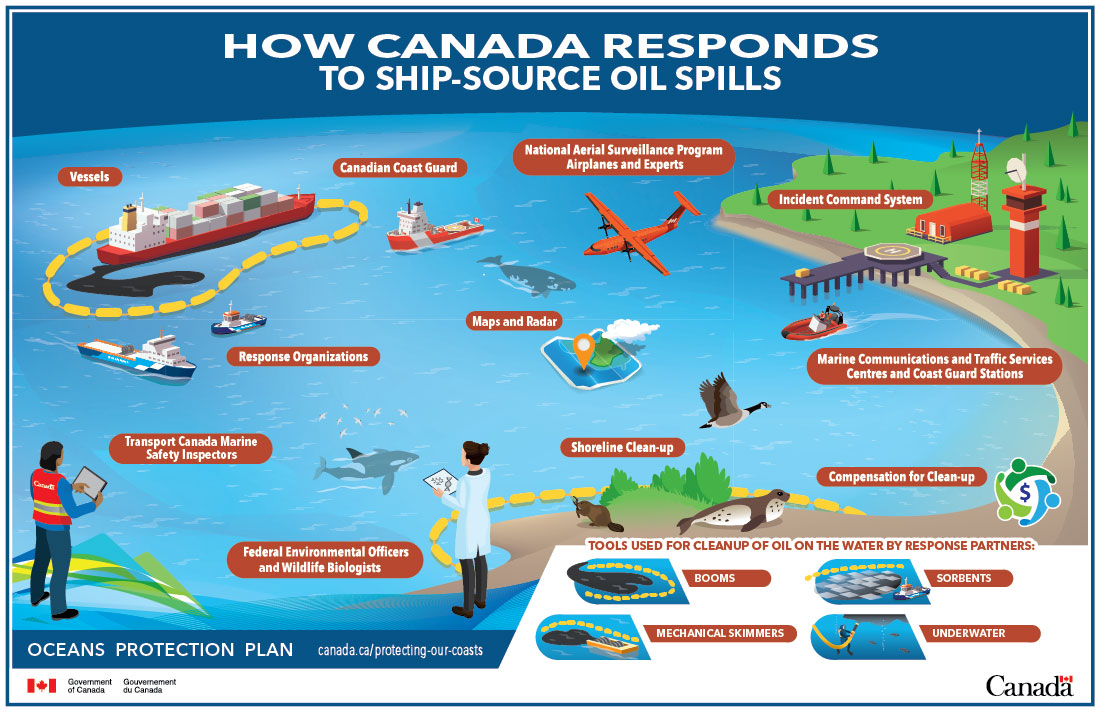Thanks to the progress we've made together, our marine safety system is stronger and our marine environment is better protected than ever before
Before the Oceans Protection Plan launched three years ago, coastal communities and Indigenous peoples said they wanted a bigger role in protecting Canada's coasts. There was no legislation to deal with the growing challenge of abandoned boats in our waterways. Our coastal ecosystems, including endangered whales, needed more protection. And despite the declining risk of ship-source spills, we wanted to be sure that we could prevent and quickly respond to any marine pollution event.
This motivated the Government of Canada to launch the Oceans Protection Plan in November 2016. Since then, we've announced over 50 projects to protect our coasts for future generations, while also growing the economy.
This includes:
- Oil Tanker Moratorium Act that protects waters off northern British Columbia, and
- the Wrecked, Abandoned or Hazardous Vessels Act:
- holds owners responsible for neglecting their vessels
- improves the federal government's ability to act on problem vessels, and
- requires owners of larger vessels to carry wreck removal insurance while in Canadian waters
The Government of Canada also:
- funded 63 projects through the Coastal Restoration Fund that will restore coastal ecosystems
- improved our ability to respond to emergencies, opening three new Coast Guard search and rescue stations in Newfoundland and Labrador, and re-opening the Maritime Rescue Sub-Centre in St. John’s
- launched two programs that have supported our assessment or removal of 280 abandoned boats across Canada
- partnered with 10 coastal communities to launch a new, user-friendly maritime awareness information system
- hired Environmental Emergency Officers and Wildlife Emergency Response Coordinators in several regions across Canada to support emergency preparedness and response, and
- committed $167.4 million to the Whales Initiative to help protect and recover the population of Southern Resident killer whales, North Atlantic right whales, and St. Lawrence Estuary belugas
These are just a few examples of how the Government of Canada is taking action, working with Indigenous peoples, coastal communities, the marine industry, and non-government organizations. Thanks to the progress we have made together, our marine safety system is stronger and our marine environment is better protected than ever before.
For more information, read the latest Report to Canadians: Investing in our coasts through the Oceans Protection Plan.
Stories from our coasts
The Marine Training Program is funded through the Oceans Protection Plan. The program was created to expand traditional learning, e-learning, and blended learning programs at Canada’s marine training schools.
“This is my first year at the Marine Training Centre taking the Bridge Watch Training program. After I complete all my certificates, I hope to get a job working on a ship for six months. There aren’t a lot of women who are interested in this course right now – I’m one of two women in the program - but I think women from all around should be applying because there will be a lot of job opportunities for them in the future.
With all the training I’m doing right now, I can also go back home to Deline, Northwest Territories, and take on more projects near the Great Bear Lake, also known as the “Water Heart”. Since I live next to one of the biggest freshwater bodies, I’m glad that the Government of Canada is investing in protecting our oceans and waters and preventing oil spills.”
Cheyanne, student of the Marine Training Centre in Hay River, NWT, a school funded through the Oceans Protection Plan
2020 protections for Southern Resident killer whales and North Atlantic right whales
The Government of Canada recently announced the 2020 rules (protection measures) to support the survival and recovery of the Southern Resident killer whale and North Atlantic right whale.
To protect Southern Resident killer whales, measures include creating interim (temporary) sanctuary zones, banning vessels from being within 400 metres of any killer whale in southern BC, protecting their main food source (Chinook salmon), and asking vessels to reduce their speed and to not fish within 1000 metres of killer whales. The Government is also again partnering with the ECHO Program to implement a voluntary slowdown and lateral displacement to deal with acoustic disturbance from large commercial vessels. More information on how we’re protecting Southern Resident killer whales.
In February, we announced enhanced protection measures for the North Atlantic right whale that are in effect from April to November 2020 in Atlantic Canada and Quebec. These protections are focused on:
- preventing vessel collisions by requiring vessels to slowdown or avoid key areas, and
- preventing entanglements in fishing gear by closing fishing areas when and where whales are present
More information on how we’re protecting Canada’s endangered whales.
Update on COVID-19 and Oceans Protection Plan engagement
Due to the COVID-19 pandemic, our team is adjusting how we work, including working from home and using technology to keep in touch and deliver services to our partners and stakeholders.
Despite the challenges, Oceans Protection Plan consultations have continued via videoconference when possible. We’re committed to keeping up our momentum and meeting our goals together.
We’ve heard from many of you that your office closures and other issues have affected your availability to engage with us. We understand, and recognize that the health and safety of your family and community are of utmost priority. We wish good health to you, your colleagues, family and friends during these difficult times.
What happens when oil spills in Canadian waters?
Canada has one of the strongest marine safety systems in the world, which meets and exceeds international standards. Our system, which includes regular inspections of ships travelling our waters, goes a long way toward preventing spills. While oil spills are rare, they can happen. Watch our video to learn more about how Canada responds to oil spills.
Latest announcements
- Government of Canada announces second year of enhanced measures to protect Southern Resident killer whales (May 7, 2020)
- Government of Canada invests in aquatic habitat through the Oceans Protection Plan (March 10, 2020)
- Government of Canada unveils 2020 North Atlantic right whales protection measures (February 26, 2020)
- Canadian Coast Guard working to remove MV Spudnik from Fraser River (January 6, 2020)
Upcoming events and consultations
- Let’s Talk: Compensation for Oil Spills: Share your thoughts on how an oil spill caused by a ship could cause damage or losses to your community.
- Let’s Talk: Marine Fuel in the Arctic: Have your say on reducing the risks of a fuel spill from ships, including ships using heavy fuel oil.
To subscribe or change your subscription to this newsletter, please visit the Oceans Protection Plan newsletter page on our website.





